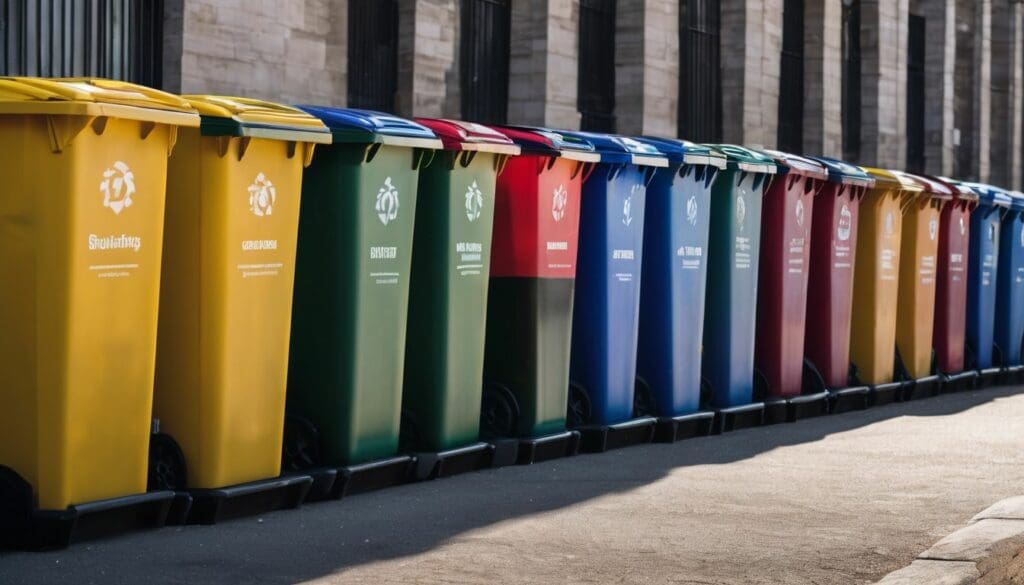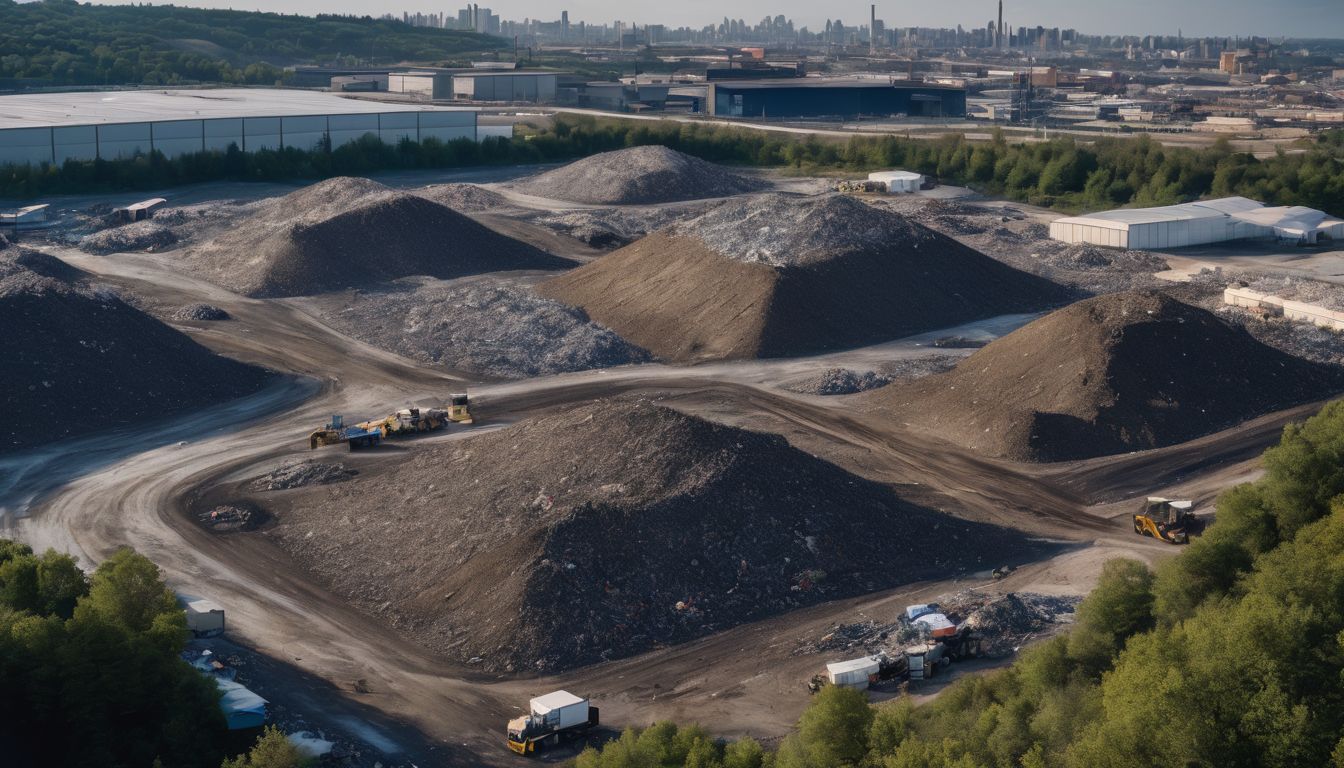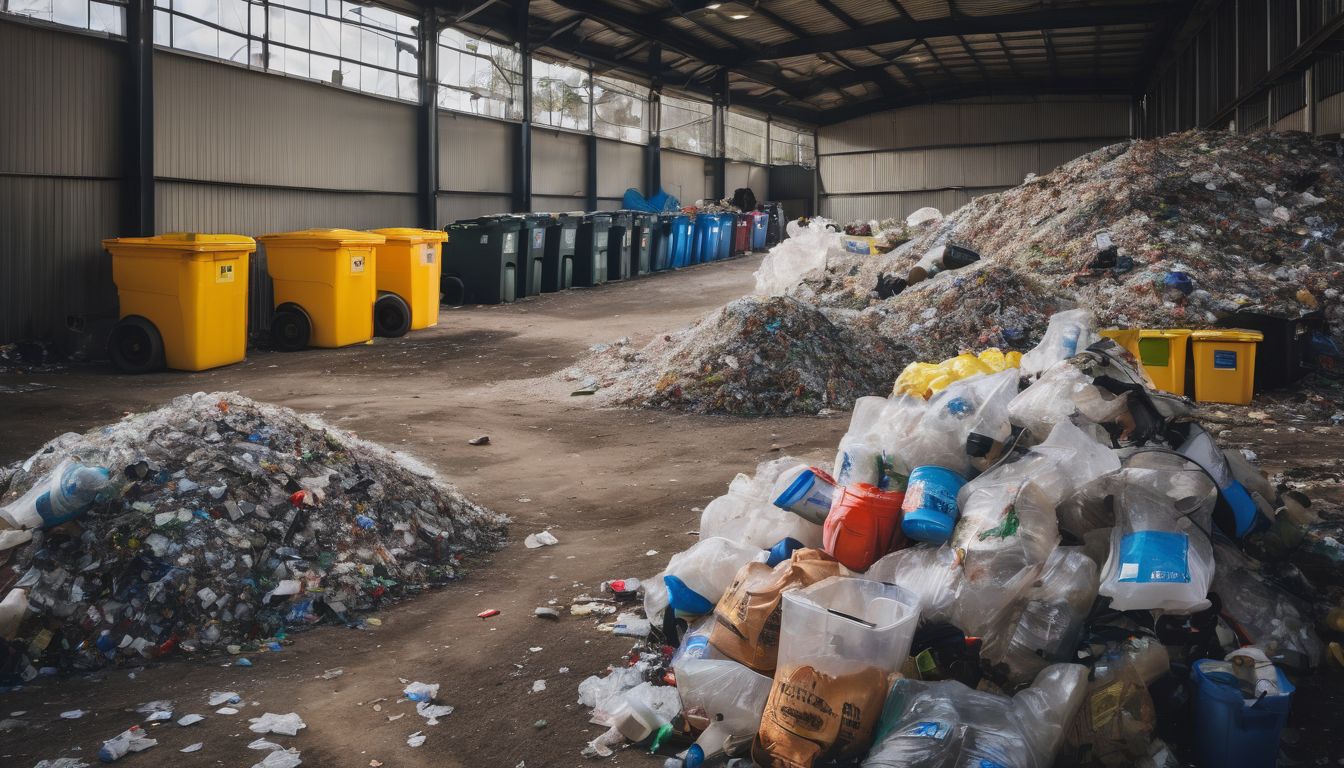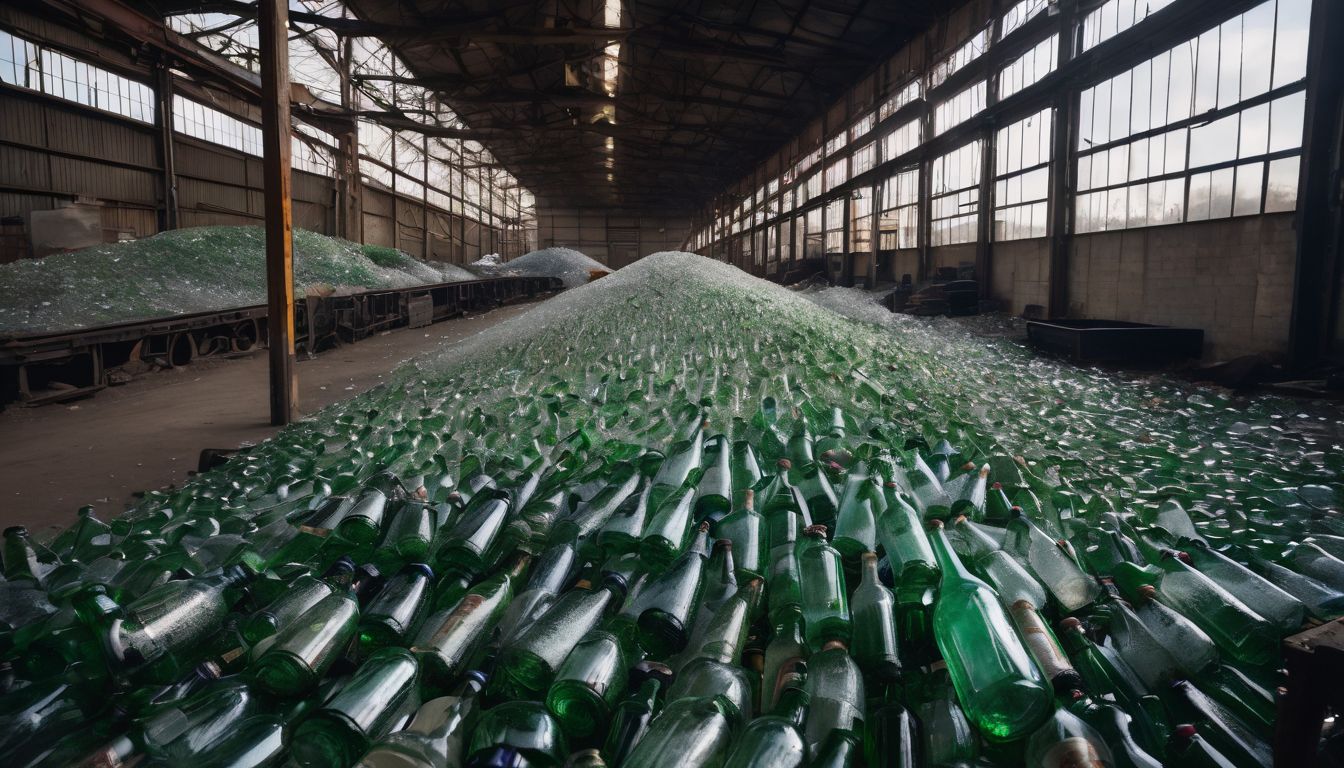Public events create heaps of waste, leaving our parks and streets littered. In just one day, a festival can produce over a tonne of rubbish that could be recycled. This guide will show you easy steps to make recycling work at any public gathering, making eco-friendly living a piece of cake.
Let’s keep things clean together!
Key Takeaways
- Position recycling and rubbish bins side by side at public events to encourage proper waste disposal, with clear signage guiding attendees on what can be recycled.
- Reserve free recycling and composting containers ahead of time for your event, placing them in high traffic areas to maximise their use and reduce waste sent to landfill.
- Educate event – goers about the importance of disposing hazardous household products like batteries and fluorescent light bulbs at dedicated collection points to prevent environmental damage.
- Avoid contaminating recyclables by keeping out items such as greasy pizza boxes or any materials that have been soiled with food or chemicals, as they spoil the entire load of recyclable material.
- Promote sustainability through careful selection of building materials for event structures and stands; choose reusable and recyclable options wherever possible.
Why Recycling at Public Events is Important
Recycling at public events is important for reducing waste, promoting sustainability, and raising awareness about the environmental impact of large gatherings. It helps to minimise the amount of waste sent to landfills and encourages attendees to adopt eco-friendly practices in their daily lives.
Reducing waste
Cutting down on waste at public events is a powerful move towards a healthier planet. By focusing on materials that can be recycled or composted, event organisers play a crucial role in reducing the amount of rubbish sent to landfills.
This proactive step not only conserves precious resources but also cuts back on pollution, helping to keep our environment clean.
Implementing effective waste management strategies at special events encourages guests to make eco-friendly choices. Use clearly marked bins for recycling and composting to guide attendees towards proper disposal of items.
Such actions demonstrate commitment to sustainability and set an example for others to follow, sparking change beyond the boundaries of the event itself.
Promoting sustainability
Promoting sustainability at public events is crucial for reducing the environmental impact of large gatherings. By incorporating recycling and waste reduction practices, event organisers can actively contribute to a more eco-friendly future.
Implementing recycling stations, limiting rubbish, and providing clear signage are effective ways to encourage attendees to participate in sustainable practices. Additionally, pairing recycling and rubbish containers and reserving free recycling and composting containers can further promote responsible waste disposal.
These efforts not only raise awareness about the importance of sustainability but also inspire individuals to adopt similar practices in their daily lives.
Raising awareness
At public events, raising awareness about the importance of recycling and sustainability is crucial. By educating attendees about waste reduction and proper recycling practices, we can inspire positive change in their behaviour.
Utilise clear signage and engaging informational materials to inform people about the impact of their actions on the environment. Encourage conversations about event sustainability and showcase the benefits of responsible waste management.
These efforts will help create a community of environmentally conscious individuals dedicated to supporting conservation and environmental protection at public gatherings.
Implementing effective strategies for promoting sustainable practices at events requires collaboration among organisers, vendors, participants, and local communities. Engage with like-minded organisations to amplify the message of environmental responsibility across various platforms such as social media, printed materials, or interactive activities during events.
How to Incorporate Recycling into Public Events
Incorporating recycling into public events can be done by limiting rubbish and providing designated recycling stations. Pairing recycling and rubbish containers, placing stations near high traffic areas, and reserving free recycling and composting containers are also effective strategies to promote waste reduction.
Clear signage can help attendees identify where to properly dispose of their waste.
Limiting rubbish and recycling stations
To limit rubbish and ensure effective recycling at public events, strategically position a limited number of rubbish bins to encourage attendees to use designated recycling stations.
Placing these stations near high-traffic areas such as food stalls can increase visibility and usage. Utilising clear signage that not only directs people to the nearest station but also educates them on what items are recyclable is essential for successful waste management.
Additionally, offering free recycling and composting containers can further motivate individuals to participate in sustainable practices, aiding in reducing waste at public gatherings.
Pairing recycling and rubbish containers
To enhance waste separation, strategically pair recycling and rubbish containers at public events. Placing these bins side by side makes it easier for attendees to dispose of their waste correctly.
Make sure the bins are clearly labelled, and consider using different colours or shapes to differentiate them. This simple setup encourages people to separate their rubbish, contributing to more efficient recycling efforts.
At crowded events, utilising paired recycling and rubbish containers can significantly reduce contamination in the recyclables. Reinforcing a clear message about responsible disposal through this method empowers event-goers to actively participate in reducing the environmental impact of large gatherings.
Placing stations near high traffic areas
Position recycling and rubbish stations strategically near high traffic areas to encourage participation. Placing these stations in visible locations ensures that attendees can easily dispose of their waste responsibly.
By doing so, it increases the likelihood of higher recycling rates and minimises contamination in the recyclables collected from the event. Additionally, clear signage near these stations will help educate and guide people on how to properly separate their waste, contributing to a more sustainable public event.
To maximise the impact of this initiative, consider placing additional stations at various entry and exit points to capture as much waste as possible before guests enter or leave the venue.
Reserving free recycling and composting containers
Reserve free recycling and composting containers in advance to ensure efficient waste management at public events. Place the containers strategically throughout the venue, considering high-traffic areas and proximity to food stalls or beverage stations.
By reserving these containers, event organisers can encourage attendees to dispose of recyclable and compostable items appropriately, contributing to a more sustainable and eco-friendly event.
Maximise the impact of your event by providing clear signage directing attendees towards the designated recycling and composting stations. This simple action encourages active participation in waste reduction efforts while creating awareness about responsible environmental practices.
Providing clear signage
Place large, clear signs near recycling and rubbish stations. Use simple language and universally recognised symbols to indicate what items belong in each bin. These signs can help attendees easily identify where they should dispose of their waste, contributing to the success of your event’s recycling efforts.
Moreover, consider placing additional signage throughout the event venue to highlight the importance of recycling and waste reduction. Prominently display messages encouraging attendees to recycle, compost, or properly dispose of their waste.
Using eye-catching visuals and concise messaging will help reinforce a culture of sustainability at your public event.
What to Put in Your Recycling Bin
Ensure that building materials, clothing, footwear, and bedding, deposit bottles and cans, electronic devices, hazardous household products, plastic bags, foam and wraps are properly disposed of in the recycling bin at public events.
Building materials
When planning a public event, it is essential to carefully consider the building materials used. Opt for recyclable and sustainable materials such as cardboard, paper, or compostable products.
These choices not only reduce the environmental impact but also enable easier waste management during and after the event. Sustainable building materials contribute positively to an eco-friendly atmosphere and demonstrate a commitment to environmental responsibility.
Furthermore, incorporating recycled or upcycled building materials can showcase creativity while promoting a circular economy. Embracing these environmentally friendly practices aligns with the goal of minimising waste at public events.
Clothing, footwear, and bedding
When it comes to recycling at public events, don’t forget about clothing, footwear, and bedding. These items can often be reused or repurposed instead of ending up in landfills. Donating gently used clothing, shoes, and bedding to local charities or thrift stores is a great way to extend the life of these items and reduce waste.
Encouraging event attendees to participate in clothing swaps or donation drives can also promote sustainable practices and minimise the environmental impact of discarded textiles.
For environmentally conscious individuals attending public events, considering the lifecycle of their clothing, footwear, and bedding can contribute to overall waste reduction efforts.
Deposit bottles and cans
To minimise waste and contribute to sustainability at public events, it’s essential to include deposit bottles and cans in the recycling efforts. By providing dedicated containers for these items, attendees can easily separate them from other waste.
This not only ensures that these materials are diverted from landfills but also supports the local recycling industry by promoting the reuse of glass, plastic, and metal packaging.
When planning a public event, incorporating specific receptacles for deposit bottles and cans is an effective way to encourage eco-friendly practices among guests while significantly reducing environmental impact.
Encouraging event attendees to dispose of their deposit bottles and cans in dedicated recycling bins promotes a culture of responsible waste management. This action helps sustainably process valuable materials that would otherwise end up in landfill sites or incinerators.
Electronic devices
Electronic devices such as mobile phones, tablets, and laptops are frequently used at public events. To recycle these items, be sure to separate them from general waste and dispose of them in designated e-waste recycling bins.
These devices contain valuable materials that can be recovered and reused, reducing the need for new raw materials and minimising environmental impact. Recycling electronic devices also helps prevent hazardous substances from entering the environment when improperly disposed of.
By recycling electronic devices at public events, you contribute to sustainable waste management while promoting a greener future.
Hazardous household products
Dispose of hazardous household products responsibly at public events by utilising designated collection points. These items include batteries, fluorescent light bulbs, and paint cans, which can release harmful chemicals if not properly managed.
Providing separate recycling stations for these materials ensures they are diverted from the general waste stream and handled appropriately. By participating in responsible disposal practices, you contribute to a cleaner environment and help protect public health.
It’s crucial to educate event attendees about the significance of disposing hazardous household products separately to prevent environmental contamination. Implement signage and announcements directing individuals to the appropriate collection areas for these items.
Plastic bags, foam, and wraps
When disposing of plastic bags, foam, and wraps at public events, it is crucial to use designated recycling stations. These items can be recycled if they are clean and dry; however, they should not be included in regular curbside recycling as they can cause issues with machinery.
It’s important to check for drop-off locations that accept these materials or return them to local retailers who may have dedicated collection points. By taking these small steps, we contribute to reducing waste and promoting sustainability at public events.
Remember that plastic bags, foam, and wraps should not be placed in standard waste bins as they contaminate other recyclables. Instead, bring reusable alternatives to the event or dispose of them responsibly by finding appropriate recycling options.
What to Avoid Putting in Your Recycling Bin
Items that cannot be recycled, contaminated items, and non-recyclable plastics. For more tips on recycling at public events, make sure to read the full blog post!
Items that cannot be recycled
Some items cannot be recycled, such as plastic bags, foam, and wraps. These materials can clog recycling machinery and should be disposed of in the regular rubbish. Additionally, contaminated items like greasy pizza boxes are not recyclable and should go in the bin to avoid contaminating other recyclables.
It’s important to know which items cannot be recycled to prevent contamination in recycling streams and ensure that only appropriate materials are processed correctly. Understanding what can’t be recycled helps keep the process efficient and effective.
Next – Contaminated items: Keeping recycling streams clean
Contaminated items
To effectively manage waste at public events, it’s crucial to be aware of and avoid contaminated items. Contaminated items include any materials that have come into contact with food, liquids, or chemicals, making them unsuitable for recycling.
When contaminated items are placed in the recycling bin, they can spoil the entire load of recyclables and render them unusable. The presence of these items increases the cost and effort required for sorting and cleaning recyclables properly.
Educating event attendees about the importance of keeping contamination out of recycle bins is essential to ensure a successful recycling programme. Clear signage and communication regarding what constitutes contamination will help in preventing improper disposal practices during events.
Non-recyclable plastics
Non-recyclable plastics like plastic bags, foam, and wraps should be avoided in recycling bins at public events. These items can cause contamination and clog the sorting machinery at recycling facilities.
It is important to dispose of non-recyclable plastics in the correct waste stream to avoid disrupting the recycling process.
By keeping non-recyclable plastics out of recycling bins, we can help prevent recyclable materials from being contaminated and ultimately reduce the amount of waste sent to landfills.
Conclusion
In conclusion, event recycling plays a crucial role in reducing waste and promoting sustainability. Incorporating recycling at public events is essential for raising awareness about environmental impact.
By following the guide to recycling at public events, we can all contribute to creating zero waste event strategies and supporting eco-friendly event practices. Let’s work together to make every public event a model of sustainable event management.
FAQs
1. What is recycling at public events all about?
Recycling at public events is a way to manage waste by separating recyclables from rubbish, using composting, and aiming for zero waste through sustainable event practices.
2. How can I plan a zero-waste event?
Start with eco-friendly event planning that includes strategies like composting at events, providing clear recycling guides, and implementing green event initiatives to reduce environmental impact.
3. Are there special ways to manage recycling for larger gatherings?
Yes! Special event recycling involves setting up specific zones for recycling and composting, having clear signs for rubbish separation, and following event sustainability guidelines.
4. Can an entire venue participate in waste reduction efforts during events?
Definitely! Venue recycling programmes are essential for large-scale waste reduction at events; they encourage everyone to recycle more effectively while attending the gathering.
5. Why is it important to have sustainable event management?
Sustainable event management helps lessen the negative effects on our environment by reducing landfill-bound waste and promoting green practices among attendees of any public gathering.





